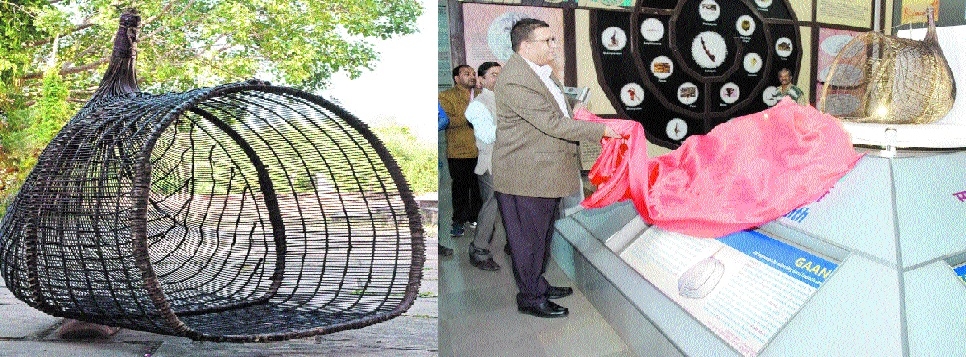EoM: ‘Gaanj’ is a traditional equipment to collect Makhane
| Date :14-Feb-2020 |

The traditional equipment, ‘Gaanj’, brought from Bihar at IGRMS. The Exhibit of the Month being inaugurated at IGRMS.
Staff Reporter :
People will get the chance to know about the traditional equipment, ‘Gaanj’, used by the fishermen community in Bihar to collect the Lotus seeds, known as Makhana, in the newly-arrived Exhibit of the Month (EoM), inaugurated at Indira Gandhi Rashtriya Manav Sangharalaya (IGRMS) on Wednesday. ‘Gaanj’ will be displayed in the Veethi Sankul open air museum of the museum in the February month, under the popular series of exhibits displayed by the museum. ‘Gaanj’ has been brought by the authority from Sapt Parvati Toll village, situated in the Madhubani district of Bihar.
The exhibit of the month was inaugurated by the Director of the Museum, Dr P K Mishra, who was also joined by huge number of visitors, to see the traditional equipment, made up from basket. “Bihar’s traditional equipment, ‘Gaanj’ is used by the fishermen community, ‘Mallah’ to collect Makhana seeds, locally known as ‘Gurri’. Collection of the aquatic seed, Makhana, is an important economical activity for the fishermen community. Brought from Madhubani, Bihar, the traditional equipment, Gaanj, is made up from bamboo and looks similar to a bamboo basket. It is broader and hollow from the front side. This equipment, after submerging into water, is dragged to collect the seeds from the swampy mud.
After which, Gurri is obtained after cleaning it from water”, said Srikant Gupta, after the inauguration of the exhibit of February month. Looking similar to a strong and sturdy horn, ‘Gaanj’, made up from bamboo and cane, is hollow cylindrical equipment which is broader at front side. Its narrower back side, closed at the end, is used by the fishermen to hold the equipment and drag it beneath the water to collect the precious seeds, known as ‘Gurri’. ‘Gurri’ commonly known as Makhana, is an aquatic seed, which is used by many people in religious worshipping and other cultural rituals.
Makhana is a prominent material in making sweets, mixture, puddings, and other sweet delicacies. Despite of being tasty, the aquatic seed has a high nutritional value. It is filled with healthy elements like Vitamins, proteins, calcium, minerals, etc. Madhubani is mainly known for the extensive production of Makhane in Bihar. It is mainly used in religious occasions and other festivals. In the popular festival of the region, ‘Kojagara’, family of the bride, prepare various dishes from Makhane, and offer it to the family of groom. 80% of the total Makhane production of the country is done only in Bihar, the rest of the production is done in other states like Manipur, Assam, West Bengal, Odisha, etc.
